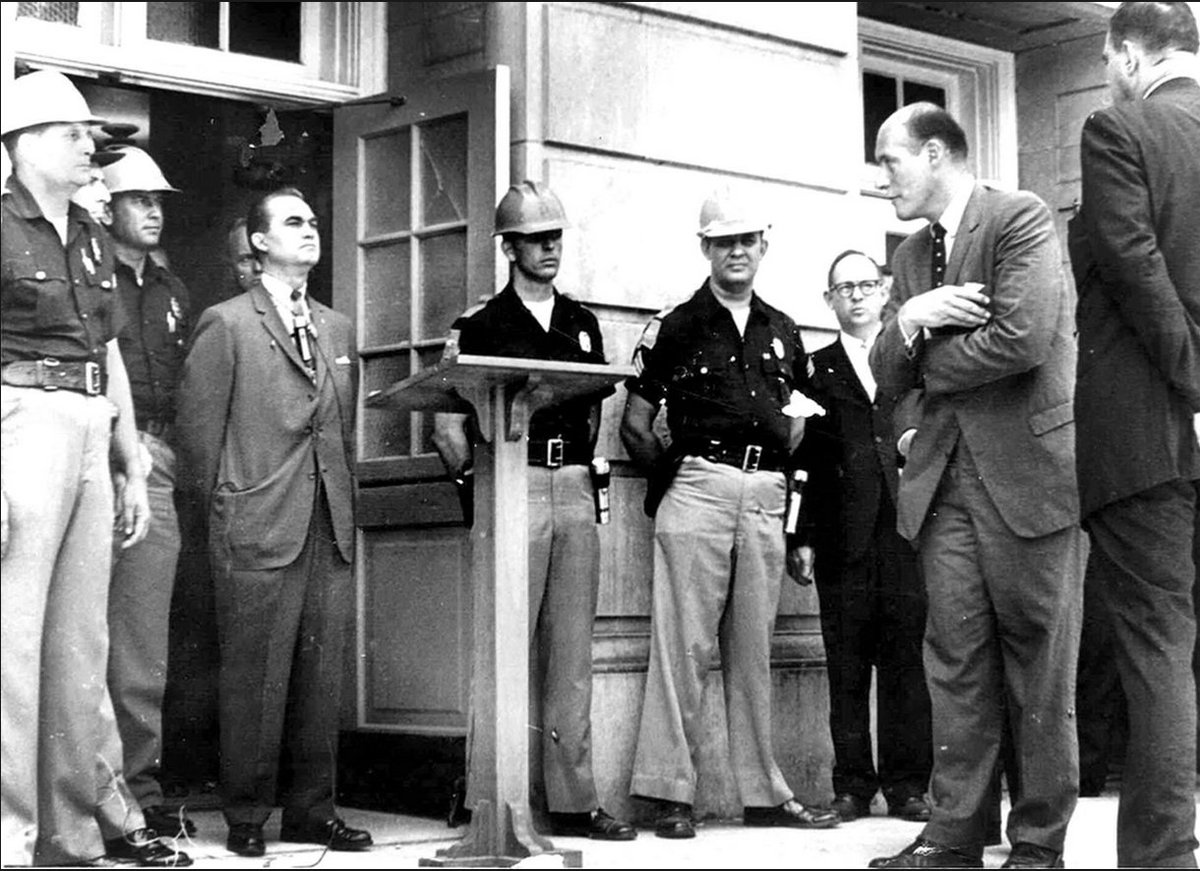
As many have noted, today marks the 55th anniversary of the assassination of civil rights leader Medgar Evers.
While he officially died in the early hours of June 12, 1963, Evers' death is better understood as the final act of the amazing day before.
While he officially died in the early hours of June 12, 1963, Evers' death is better understood as the final act of the amazing day before.
External Tweet loading...
If nothing shows, it may have been deleted
by @LIFE view original on Twitter
As June 11, 1963, began, most Americans expected the real drama to come from the University of Alabama, where segregationist Governor George Wallace stood ready to "stand in the schoolhouse door" to prevent its court-ordered desegregation by Vivian Malone and James Hood. 

While the nation worried that Alabama would see an ugly repeat of the deadly white riot that rocked Ole Miss the summer before, in truth, the showdown between Wallace and DAG Nick Katzenbach was all for show -- as this reverse angle of that iconic photograph makes clear. 

By the end of the hot afternoon, all sides were satisfied -- George Wallace had secured his defiant photo op, while Vivian Malone and James Hood had successfully registered as new students and officially integrated the university. 

Back in Washington, President John F. Kennedy was so relieved that the day had turned out well that he made an impromptu decision to address the nation that same night -- June 11, 1963 -- in order to introduce the legislation that would become the Civil Rights Act of 1964.
JFK had always been halfhearted in his support of civil rights, but he finally committed himself to the cause in this speech.
"We are confronted primarily with a moral issue. It is as old as the Scriptures and as clear as the Constitution."
Watch:
"We are confronted primarily with a moral issue. It is as old as the Scriptures and as clear as the Constitution."
Watch:
Civil rights leaders were, quite simply, amazed.
"I have just listened to your speech to the nation," MLK Jr. wrote hastily from his home. "It was one of the most eloquent profound and unequiv[oc]al pleas for Justice and Freedom of all men ever made by any President."
"I have just listened to your speech to the nation," MLK Jr. wrote hastily from his home. "It was one of the most eloquent profound and unequiv[oc]al pleas for Justice and Freedom of all men ever made by any President."
In Jackson, Mississippi, the family of the NAACP state field secretary, Medgar Evers, stayed up late to see what their father thought of the president's speech and all that had unfolded on June 11, 1963.
Around midnight, Medgar Evers' children heard the familiar sound of their father's Oldsmobile pulling into the driveway.
He got out of the car, picked up a stack of sweatshirts stenciled "JIM CROW MUST GO" and turned to enter his home.
He got out of the car, picked up a stack of sweatshirts stenciled "JIM CROW MUST GO" and turned to enter his home.

Across the street, hidden among the honeysuckle vines, a white supremacist named Byron de la Beckwith squinted through the scope of a 30.06 Winchester rifle, squeezed the trigger, and ripped a bullet through the activist’s back.
At the crack of the gun, his kids inside threw themselves to the floor, precisely as their father, a veteran of the Normandy landing, had trained them.
When no more shots came, they hurried outside to find their dad face down and bloodied in their driveway.
When no more shots came, they hurried outside to find their dad face down and bloodied in their driveway.

In the early hours of June 12, 1963, Evers passed away.
After the civil rights breakthroughs of the day before, in Tuscaloosa and Washington DC, and across the country, too, his assassination proved a powerful reminder of just how much further the nation still had to go.
After the civil rights breakthroughs of the day before, in Tuscaloosa and Washington DC, and across the country, too, his assassination proved a powerful reminder of just how much further the nation still had to go.

• • •
Missing some Tweet in this thread? You can try to
force a refresh








